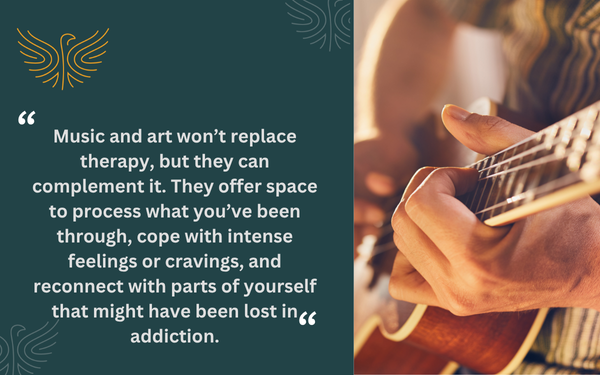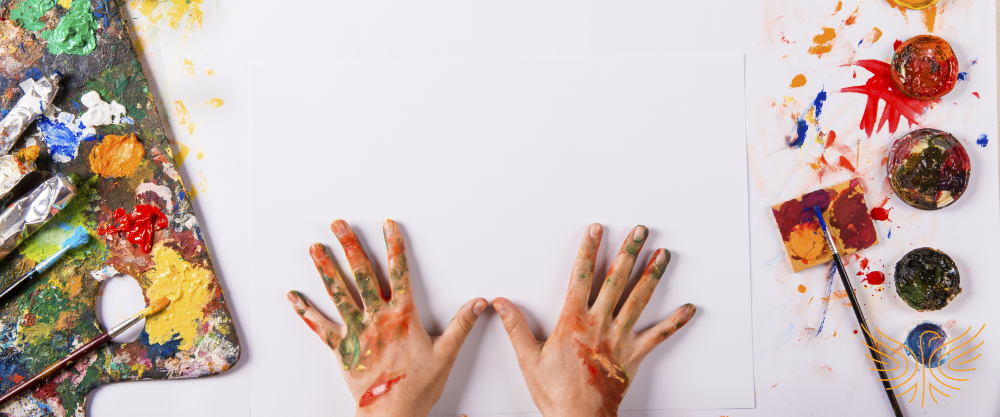Recovery often brings up emotions that feel too big or complex to put into words - grief, fear, hope, and everything in between. And this is where music and art can really help. They offer ways to express what you’re feeling without needing to explain it out loud or even fully understand it, at least not yet.
Creative expression lets you explore your emotions through sound, color, and movement. You can paint your anxiety, drum through frustration, or write a song about what you’re hoping for.
At the same time, music and art won’t replace therapy, but they can complement it. They offer space to process what you’ve been through, cope with intense feelings or cravings, and reconnect with parts of yourself that might have been lost in addiction. So, how exactly can music and art help guide your recovery journey?

_______________________________________________________
The Benefits of Music and Art in Recovery
The benefits of incorporating creative expression into recovery include:
- Provides stress relief
- Improves mood
- Rebuilds a sense of identity
- Fosters connection (with yourself and others)
- Offers a way to express yourself
- Gives way to increased purpose and joy
So, how do music and art support the above benefits? What should you know?
_______________________________________________________
How Does Music Help With Addiction Recovery?
Addiction often stems from emotional pain, trauma, or difficulty processing complex emotions. Many people turn to substances because they provide temporary relief from overwhelming emotions or because they never learned healthy ways to handle stress, grief, or anxiety. Thus, in early recovery, especially when those familiar coping mechanisms are no longer available, it can feel incredibly difficult to express what you’re going through with words alone.
Essentially, music helps bypass these verbal barriers, allowing you to express yourself freely without needing to explain or justify your feelings. Whether you’re listening to a song that captures exactly how you feel, playing an instrument to release tension, or writing lyrics about your experiences, music provides a healthy emotional release that can reduce internal pressure and give you a sense of agency over your emotions.
Creative musical activities are consistently associated with lower stress levels, improved mood, and increased self-awareness. When you’re engaged in making or experiencing music, you’re often in a state of flow where worries about the past or future fade into the background, allowing you to be fully present in the moment.
How Music Impacts the Brain
Engaging with music activates the brain’s reward centers and naturally increases dopamine—the same neurotransmitter that substances artificially stimulate, but that’s often depleted during early recovery.
Music also has powerful effects on mood regulation and anxiety reduction. It can slow your heart rate, lower blood pressure, and activate the parasympathetic nervous system, which helps your body relax and heal. The rhythmic and melodic elements of music can help regulate emotional states, providing calm when you’re agitated or energy when you’re feeling low.
Perhaps most importantly, music connects memory and emotion in unique ways, making it a handy tool for reflection and healing. A song might help you access and process feelings about your past. Meanwhile, creating new musical experiences can help you build positive associations and memories in recovery.
_______________________________________________________
How Does Art Therapy Help?
Similarly, art provides a way to externalize internal struggles without needing to explain or defend them. When you’re dealing with complex emotions like grief over what you’ve lost, guilt about past actions, anger at your circumstances, or hope for your future, creating visual art can help you get these feelings out of your head and onto paper, canvas, or other materials.
This externalization process offers a safe outlet for emotions that might otherwise feel overwhelming or frightening. In other words, art allows you to explore complicated feelings in a contained, manageable way. You can make your anxiety into abstract shapes and colors, turn your anger into bold strokes, or represent your hope through uplifting imagery.
Art also naturally encourages slowing down, reflection, and mindful awareness—qualities that are incredibly helpful for people managing anxiety, impulsivity, or racing thoughts.
_______________________________________________________
Begin Paving Your Road Forward Today
The first step is often the hardest. But recovery is possible, and you don’t have to do it alone. At Freedom Recovery Centers (FRC), our team is here to help guide you every step of the way. Through multiple therapies and approaches, we ensure that each individual enters a program that works for them and their individual circumstances. Curious to learn more? Call us at 804-635-3746; our phone lines are open 24/7. Or fill out our online form to begin your recovery journey today.
.svg)






.svg)

.svg)



.svg)
